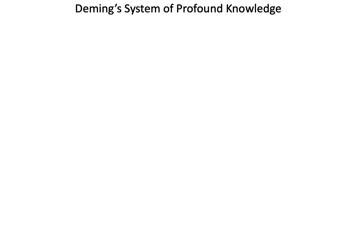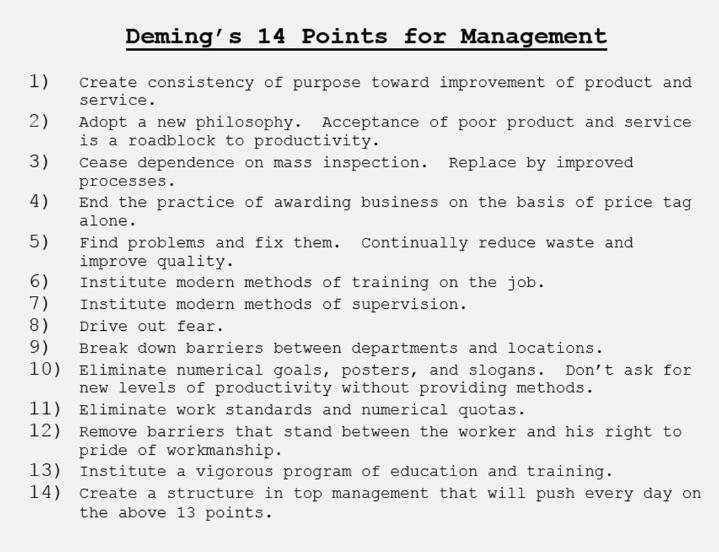Deming developed his system of profound knowledge to describe the work of organisations.
 Photo by Thomas Kelley on Unsplash
Photo by Thomas Kelley on Unsplash
William Edwards Deming is one of the most influential industrialists of the 20th century. He is responsible for introducing the quality systems that drove the industrialisation of Japan following the Second World War, turning it from a backwater humiliated and destroyed at the the end of the war, into a modern leader of technology and innovation by the end of the 20th century. This came about with Deming?s philosophy, pushing quality ahead of production which was taken to heart by the leaders of Japanese industry and developed into some of the the most successful production systems, most famously the Toyota production system.
Deming codifies his view on how organisations work into his system of profound knowledge:
the system of profound knowledge is made up of four components through which the world is looked at simultaneously. These components function as lenses through which we see, and all four are related to each other:
- Appreciation for a system,
- Knowledge about variation,
- Theory of knowledge, and
- Knowledge of psychology

The reason that Deming believed his theory of profound knowledge was so important was that it would help individuals to transform within their organizations, which would, in turn, improve the outcomes in quality improvement efforts. Understanding and applying the four parts of Deming?s theory, he believes, will create a better leadership culture.
Deming System of Profound Knowledge
In more detail the four elements:
- Appreciation of a System: A business is a system. Action in one part of the system will have effects in the other parts. We often call these ?unintended consequences.? By learning about systems we can better avoid these unintended consequences and optimize the whole system.
- Knowledge of Variation: One goal of quality is to reduce variation. Managers who do not understand variation frequently increase variation by their actions. Critical to this is understanding the two types of variation ? Common cause which is variation from the system and Special cause which variation from outside the system
- Theory of Knowledge: There is no knowledge without theory. Understanding the difference between theory and experience prevents shallow change. Theory requires prediction, not just explanation. While you can never prove that a theory is right, there must exist the possibility of proving it wrong by testing its predictions.
- Understanding of Psychology: To understand the interaction between work systems and people, leaders must seek to answer questions such as: How do people learn? How do people relate to change? What motivates people?
Deming?s theory of profound knowledge is a management philosophy grounded in systems theory. It is based on the principle that each organization is composed of a system of interrelated processes and people which make up system?s components. The success of all workers within the system is dependent on management?s capability to orchestrate the delicate balance of each component for optimization of the entire system.
Deming believed profound knowledge generally comes from outside the system and is only useful if it is invited and received with an eagerness to learn and improve. A system cannot understand itself without help from outside the system, because prior experiences will bias objectivity, preventing critical analysis of the organization. Critical self-examination is difficult without impartial analysis from outside the organization. Also, insiders can rarely serve as hostile critics who speak frankly without fear of reprisals.
Providing practical guidance on implementing the four part of his system of Profound Knowledge, Deming created the 14 Points for management. Deming goes into great detail outlining these in his book ?Out of the Crisis? which have also been reprinted with details here.
 Deming?s 14 Points
Deming?s 14 Points
Deming?s 14 points have had far-reaching effects on the business world.
While they don?t really tell us exactly how to implement the changes he recommends, they do give us enough information about what to change.
The challenge for all of us is to apply Deming?s points to our companies, departments, and teams. Taken as a whole, the 14 points are a guide to the importance of building customer awareness, reducing variation, and fostering constant continuous change and improvement throughout organizations.
Let me know what you think? I?d love your feedback. If you haven?t already then sign up for a weekly dose just like this.
References:
Bowen, R ? Deming?s Theory of Profound Knowledge: Explaining the Four Parts of Deming?s Theory
Carder, Brooks, 2013 ? Deming?s Profound Knowledge for Leadership
Mindtools ? Deming?s 14-Point Philosophy, A Recipe for Total Quality
Using SPC with Indusoft Web Studio and How It Relates To Andon
Wikipedia ? https://en.wikipedia.org/wiki/W._Edwards_Deming
Let me know what you think? I?d love your feedback. If you haven?t already then sign up for a weekly dose just like this.
Get in touch? ? linktr.ee/Tomconnor
More like this from 10x Curiosity
- Complex Adaptive Systems ? Simple Rules, Unpredictable Outcomes ? The concept of managing through a series of simple rules is an intriguing one. Could magic in our organisations occur through less rather than more control?
- The Flywheel EffectExploring the power of simple reinforcing loops executed over time
- Serendipity and the Adjacent Possible ? Why do many great ideas get discovered at almost the same time? How can you cultivate serendipity and move into the adjacent possible with your work?
- Bayes ? How Can you be less wrong? ? Bayesean thinking is all about using the information around you to be less wrong.



